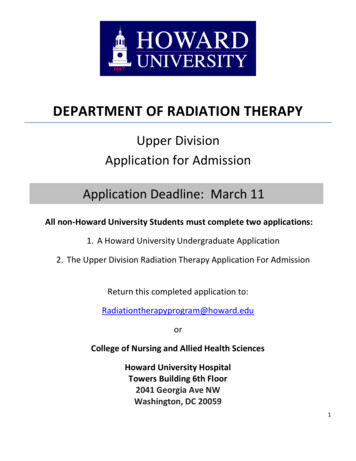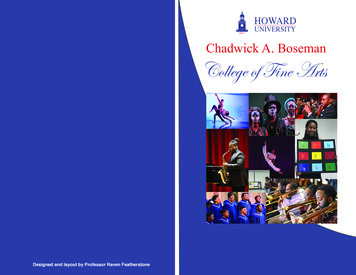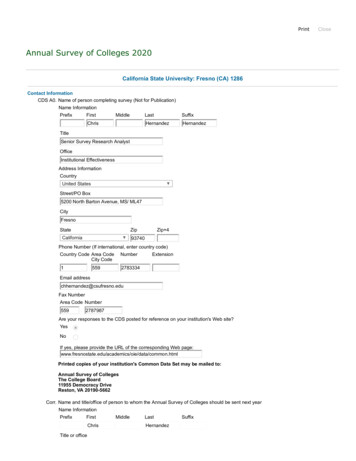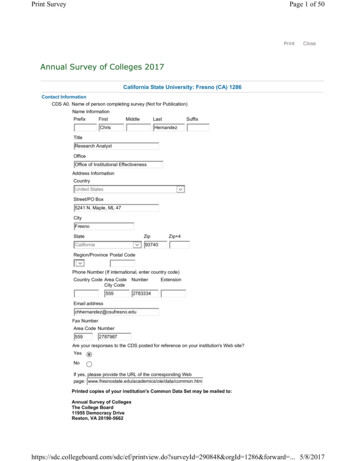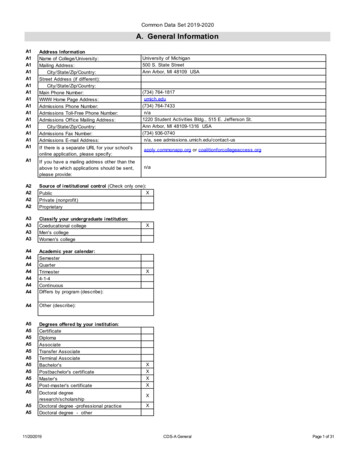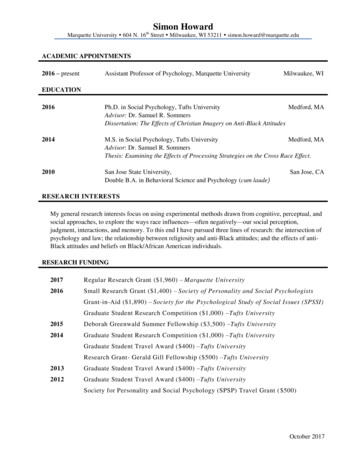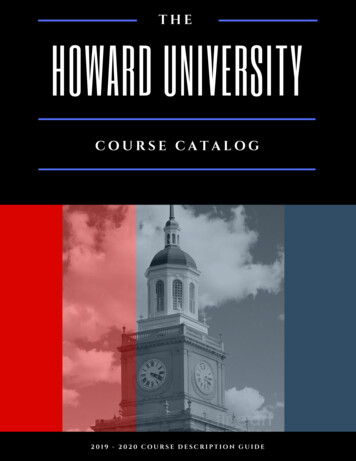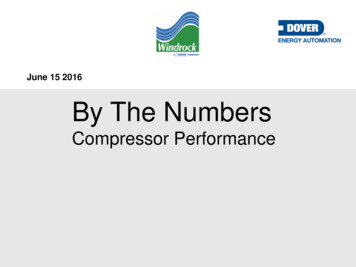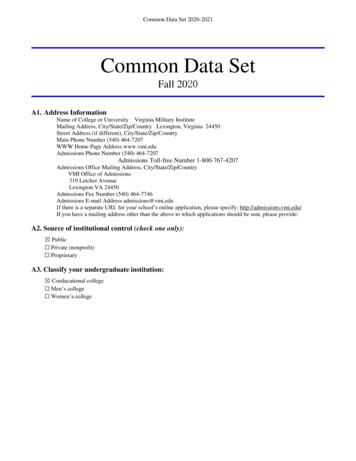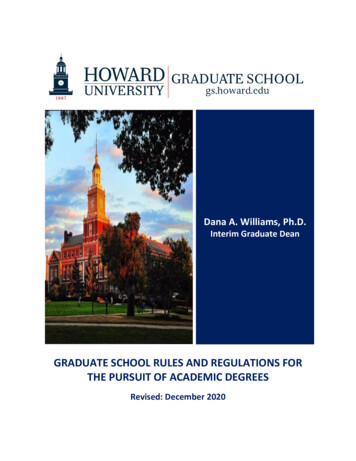
Transcription
Dana A. Williams, Ph.D.Interim Graduate DeanGRADUATE SCHOOL RULES AND REGULATIONS FORTHE PURSUIT OF ACADEMIC DEGREESRevised: December 2020
WELCOME FROM THE GRADUATE DEANDear Graduate Students:I am pleased to provide you with the Graduate School’s handbook on Rules and Regulationsfor the Pursuit of Academic Degrees (Revised 01-08-20). New and continuing studentsshould find this graduate handbook very helpful in navigating life in the Graduate School. Ifyou are a new student, we are delighted that you chose Howard, and we hope that yourgraduate experience at Howard will exceed all of your aspirations, and expectations. If youare a continuing student, we hope that the coming years leading to commencement willcontinue to be rewarding and productive for you.The Graduate Student Handbook describes the important rules and regulations for graduatestudy and is the primary document that you should use to help navigate your graduatematriculation process. Many departments also publish their own secondary handbook forgraduate students, and it is important to become familiar with that document in conjunctionwith other online university student manuals such as the H Book.The Graduate School is an administrative school that provides administrative assistance andservices to graduate students and graduate faculty. Your best resources, however, are likelyto be in your department or graduate program. I strongly encourage you to regularly meetwith your adviser, the Director of Graduate Studies, and other graduate faculty members forassistance. The Office of the Senior Associate Dean and the Office of Graduate Student Affairsare available have any academic or non-academic issues arise that you would prefer todiscuss with someone outside of your academic program. You are also welcome to contactme in the Office of the Graduate Dean.I encourage you to take advantage of the Graduate Student success series, interdisciplinarycourses , academic and professional workshops, research symposia, and graduate certificateprograms to provide additional avenues that will surely enhance your graduate experience.I wish you all the best.Regards,Dana A. Williams, Ph.D.Interim Graduate DeanProfessor of African American Literature1 Page
TABLE OF CONTENTSWELCOME FROM THE GRADUATE DEAN . 1TABLE OF CONTENTS . 2ARTICLE I. ADMISSIONS. 6Section 1. Admission to the Graduate School. 6Section 2. Admissions to the Department . 7Section 3. Departmental Admissions Committee . 7Section 4. Committee on Graduate Studies. 8Section 5. Categories of Admissions . 8A.Degree-Regular Student. 8B.Degree-Provisional Student . 8C.Unclassified Student (Non-Degree Student) . 8Section 6. Academic and Research Advisement . 9Academic Advisor. 9Research Advisor. 9Section 7. Readmission to the Graduate School . 9A.Medical Clearance . 10Section 8. Pursuit of an Advanced Degree by a Graduate Faculty Member. 10ARTICLE II. REGISTRATION AND ENROLLMENT . 10Section 1. Permanent Record . 10Section 2. Student Load . 10Section 3. Leave of Absence for Exceptional Family Circumstances . 11Section 4. Temporary Interruption of Student's Program for Other Reasons . 13Section 5Howard E-Mail Address. 13Section 6Consortium Courses . 13Section 6Health Insurance . 14ARTICLE III. GRADES AND COURSE CREDIT . 14Section 1. Letter Grades and Their Value . 14A.The Grading System . 14B.D and F Grades . 152 Page
C.Incomplete Grades . 15Section 2. Change of Grade. 16Section 3. Approval for New or Additional Courses . 16Section 4. Auditors . 16Section 5. Undergraduate Courses Taken by Graduate Students . 16Section 6. Graduate Courses Taken by Undergraduate Students . 16Section 7. Transfer of Credit to Graduate Degrees. 17Section 8. Cheating and Plagiarism . 17Article IV. OTHER REQUIREMENTS FOR THE DEGREE . 17Section 1. English Competency and Expository Writing . 17The McGraw-Hill Expository Writing Course . 18Exemption from the Expository Writing Examination . 19Section 2. Responsible Conduct of Research . 19ARTICLE V. GENERAL REQUIREMENTS FOR THE MASTER'S DEGREE . 20Section 1. Residency, Credit Requirements, and Admission to Candidacy . 20A.Residency . 20B.Minimum Credit Requirements . 20C.Admission to Candidacy . 20Section 2. Course Requirements . 21A.Length of Time for Completion of the Master’s Degree . 22B.Course Viability . 22C.Enrollment in Thesis Writing Courses . 22D.Assignment of Grades for Thesis Writing Courses . 23E.Enrollment in the Semester in Which the Degree is conferred. . 23Section 3. Program of Study . 23Section 4. Grades and Academic Status. 23Section 5. Transfer of Credit . 23Section 6. Foreign Language Requirement for a Master’s Degree . 24Section 7. Qualifying and/or Comprehensive Examination . 24Section 8. Thesis or its Equivalent: Committee, Document, and Defense . 24A.The Committee . 25B.The Document. 25C.Defense . 253 Page
ARTICLE VI. GENERAL REQUIREMENTS FOR DOCTOR OF PHILOSOPHY DEGREE . 26Section 1. Residency, Credit Requirements, and Admission to Candidacy . 26A.Residency . 26B.Minimum Credit Requirements . 26C.Admission to Candidacy . 26Section 2. Course requirements. 27A.Length of Time for Completion of the Ph.D. Degree . 27B.Course Viability . 27C.Enrollment in Dissertation Writing Courses . 28D.Assignment of Grades for Dissertation Writing Courses . 28E.Enrollment in the Terminal Semester . 28Section 3. Grades and Academic Status. 29Section 4. Program of Study . 29Section 5. Earned Credit Transferal to the Ph.D. Degree. 29Section 6. Foreign Language Requirement . 30Section 7. Ph.D. Qualifying and/or Comprehensive Examinations . 30Section 8. Dissertation Proposal, Committee, Document, and Defense . 30A.Dissertation Proposal . 31B.Dissertation Committee . 31C.Dissertation Document . 31D.Final Oral Examination and Defense of the Dissertation . 32ARTICLE VII. GENERAL REQUIREMENTS FOR CERTIFICATE PROGRAMS . 33Section 1. Residency and Credit Requirements . 33A.Residency . 33B.Minimum Credit Requirements . 33Section 2. Course Requirements . 33A.Length of Time for Completion of the Certificate Program . 33B.Course Viability . 34Section 3. Grades and Academic Status. 34Section 4. Program of Study . 34Section 5. Transfer of Credit to a Certificate Program. 34ARTICLE VIII. APPEAL OF ACADEMIC DECISIONS. 35Section 1. The Informal Process . 354 Page
Section 2. The Formal Process . 35ARTICLE IX. FINANCIAL AID . 36Section 1. Appointment Termination . 36Section 2. Expectations for Graduate Students Who Receive Tuition Awards and/or Stipends ( 10K )(Approved by the Provost and Chief Academic Officer AY 2019-20). 37ARTICLE X. GRADUATE PROFESSIONAL DEVELOPMENT . 39Section 1. Development Plan . 39Section 2. Graduate Student Success Series (GS3) . 40Section 3. Graduate Student Success Series (GS3) . 40Article XI. Commencement . 40Section 1. Diplomas . 40Section 2. Name on Diploma . 40Section 3. Address Diploma is Sent To. 40Section 4. Translating the Diploma . 41ARTICLE XII. Howard University Credit Hour Assignment Policy . 41ARTICLE XIII. Academic Code of Student Conduct . 41Section 1. Definitions of Academic Infractions . 42ARTICLE XIV. Administration of the Code . 42Section 1. Procedure . 43Article XV. TITLE XI . 44Section 1. Howard University Title IX Policy Summary of Key Provisions. 44Section 2. Where and to Whom Does the Title IX Policy Apply? . 445 Page
ARTICLE I. ADMISSIONSSection 1. Admission to the Graduate SchoolAny graduate with a minimum cumulative grade point average of 3.0, an undergraduatebaccalaureate degree from an accredited institution, or any international student withequivalent qualifications is eligible to apply for admission to the Graduate School.Graduate work is under the jurisdiction of the Graduate Faculty of various departments. Astudent is expected to have adequate undergraduate training in the field in which theindividual plans to do graduate work. If a student's training is found to be inadequate, theindividual will be required to take such additional courses as the department may prescribe.Admission to the Graduate School does not automatically admit a student tocandidacy for an advanced degree.Graduate admission is processed by the university's Office of Admission located in theAdministration Building, 2400 Sixth Street, NW Washington, D.C. 20059. Applicants startthe application process via the GradCAS system. Once applicants upload and submit theapplication to GradCAS, the Office of Admission sends confirmation of receipt andupdates to the respective graduate programs. Once the application is complete, the Officeof Admissions notifies graduate programs to review applicants whose file is complete andready for review. A completed file consists of an official transcript, Graduate RecordExamination (GRE) scores, a resume, a statement of interest and/ or goals, and three lettersof recommendation. International students are also required to provide the Test of Englishas Foreign Language (TOEFL) examination scores. The minimum TOEFL score foradmission is 550 on the paper scale (213 on the computer scale) 1. Individual graduateprograms, departments and schools/colleges may require additional submissions fromapplicants. Please contact the graduate programs for any additional information. Graduateprograms have two (2) weeks after application is marked as complete to send decisions inan Excel sheet to the Office of Admission by COB on Tuesday and/or Thursday of eachweek. The Office of Admission will update students’ status with decision in WebAdmitand in Banner and send official decision via email to prospective students. After decisionemail is sent from the Office of Admissions, the Graduate School sends a follow updecision letter, reminders, and encouragements to all admitted graduate students to enroll.The prospective applicant will submit an online application via one of thefollowing Central Application Services (CAS):Unless otherwise specified, all references in this document to “department” should beconstrued to refer to the “Committee on Graduate Studies.” The Graduate School may,from time to time, update the minimum TOEFL exam score to reflect changes in thequality and coverage of the TOEFL examination.16 Page
CDCAS (Communication Sciences and Disorders Masters students)EngineeringCAS (Engineering)GradCAS (All majors without an independent CAS)PsyCAS (Psychology)Once prospective students decide which program of study they would like to apply, theyare responsible for paying Howard University’s application fee. Please note: All the CASportals also have a fee associated with them that the student is also responsible for paying.Section 2. Admissions to the DepartmentThe department in which the student plans to study shall determine whether thestudent meets the qualifications for admission to graduate study in that particulardepartment. In addition to other requested materials, the applicant shall provide the Officeof Admission, via the online CAS system, a complete transcript of academic performanceof work done at Howard and/or other institutions of higher education that the applicanthas attended. Upon receipt of the completed application, the Office of Admission shalldetermine whether the student meets the general Graduate School admissionrequirements. The Office of Admission shall notify the department and shall request thatthe department evaluate the students’ credentials. The department shall communicate itsdecision to the Office of Admission, which will then communicate with the student.If an applicant is seeking admission into an M.D. / Ph.D. program, the individual must beaccepted into both the College of Medicine and the Graduate School. The applicant mustmeet all criteria for acceptance into the College of Medicine and the Graduate School.Similarly, if an applicant is seeking admission into an interdisciplinary program or agraduate certificate program, the rules of admission for the Graduate School andparticipating units will apply.In those cases where a graduate student wishes to transfer from one graduate program inthe Graduate School to another, he/she must submit an appropriate application to theOffice of Admission and receive approval of the department in which he/she wishes toenroll. Unless approved by the Board of Trustees, a student may not matriculatesimultaneously in two graduate programs.Section 3. Departmental Admissions CommitteeEach department shall have a Departmental Admissions Committee composed ofGraduate Faculty members. This committee and other interested departmental facultymembers shall scrutinize the credentials of applicants and make recommendationsconcerning admissions decisions. Departmental admission decisions are then submittedto the Graduate School. The Dean or the Dean’s designee will notify the applicantconcerning the status of the application.7 Page
Section 4. Committee on Graduate StudiesEach department shall have a Committee on Graduate Studies consisting only of current GraduateFaculty members. The chair of this committee must be a member of the Graduate Faculty. Amongthe responsibilities of this committee are the following: (a) the performance of an annual reviewof the academic progress of each graduate student in the department; the names of those studentswho have been found to be in academic jeopardy shall be reported to the Graduate School (seealso: Article V, Section 4 and Article VI, Section 3); and (b) the recommendation to the Dean ofexternal examiners on oral defense committees whose status is comparable to that of members ofthe Graduate Faculty who also serve on such committees (see also: Article VI, Section 8).Section 5. Categories of AdmissionsA.Degree-Regular StudentApplicants who meet the stated requirements for admission to a graduate program in the GraduateSchool shall be accepted as regular students. Students with a minimum cumulative grade pointaverage greater to or equal to 3.0 and a baccalaureate degree from an accredited institution,(including any international student with equivalent qualifications,) are eligible to apply foradmission to the Graduate School as a regular student.B.Degree-Provisional StudentApplicants who have deficiencies in preparation or scholarship but are judged by the departmentto be capable of completing a graduate degree program may be accepted on a provisional basis.The student in this category will be allowed to take a maximum of ten (9) credit hours per semesterfor a maximum of two semesters and shall also satisfy all special requirements set by thedepartment before the student may qualify for admission as a regular degree student. Upon reviewof the conditions established at the time of admission, the Committee on Graduate Studies mayrecommend to the Dean that the status of the provisional student be changed to that of a regularstudent. Failure to meet requirements of the provisional admission within two semesters will resultin dismissal from the graduate program.C.Unclassified Student (Non-Degree Student)An unclassified status is an elected category for the student who wishes to pursue “course workonly.” The applicant must meet all general admission requirements and any additionalrequirements prescribed by the department. A non-degree student, upon approval andrecommendation of the department, may qualify for another category of admission in the GraduateSchool. Departments will determine the number of non-degree students they can accept on a yearlybasis. Students may transfer no more than two (2) courses earned as a non-degree student to adegree program.8 Page
Section 6. Academic and Research AdvisementAcademic AdvisorEach department shall provide graduate faculty advisement for students in the Graduate School.All graduate students must be assigned an advisor by the end of their first semester in residence.Departments will assign each incoming graduate student an academic advisor who will assist inacademic planning throughout matriculation and development of a Program of Study. The studentshall also be given a copy of the departmental handbook and/or rules and regulations as applicable.A detailed roster that reports an up-to-date status of all graduate students and their academicadvisors must be sent to the Graduate School by the end of each academic year.Research AdvisorGraduate students and/or the department must seek a research advisor who will assist students inresearch activities related to the thesis and dissertation processes. A detailed roster that reports anup-to-date status of all graduate students and their research advisor must be sent to the GraduateSchool at the end of each academic semester.Prior to advancement to candidacy, each department shall ensure that a graduate faculty researchadviser has been assigned to students in the Graduate School. The process of how this is done,unless otherwise notified by the Graduate Dean, is graduate program specific.Section 7. Readmission to the Graduate SchoolAny student dismissed for reasons other than the second failure of the comprehensive examinationor the oral defense of the thesis/the dissertation may seek readmission to the Graduate School.First, the student must complete an application to the Office of Admission and include a completerecord of prior academic performance at Howard University. Second, the student must submit awritten request for readmission to the Graduate Dean of the Graduate School. Third, the studentmust receive approval for readmission from the Graduate Dean of the Graduate School and fromthe department in which the student wishes to enroll. Reinstatement requires fulfillment ofconditions formulated by the department in which the student is a degree candidate and approvedby the Graduate Dean. Following approval, the Graduate Dean will notify the student of theseconditions.A period of at least one semester must elapse between the students’ dismissal and his/her readmittance. It is important to note that re-admittance is not guaranteed. A student who failsthe comprehensive examination or the final oral examination in defense of the thesis ordissertation a second time will be dropped from the Graduate School and is ineligible forreadmission. (see: Article VII: Appeal of Academic Decisions).Returning students who were absent from, or not registered at, the University for one entiresemester (summer session not included) are required to apply for readmission as a former student9 Page
returning (FSR). It is important to note that re-admittance is not guaranteed. FSR’s must reapplyusing the BisonWeb portal. Students must reapply 30 day prior to the first day of registration forthe upcoming term.A.Medical ClearanceAll new transfer and returning students must contact Med Proctor for their medical record review.A description of the steps may be found on their website which is linked below. Med Proctor willassist obtaining students’ medical nts/www.medproctor.comSection 8. Pursuit of an Advanced Degree by a Graduate Faculty MemberAn individual who holds a current special appointment as a member of the Graduate Faculty isineligible to pursue an advanced degree from the Graduate School. Faculty members may enrollin courses for credit, but such work may not be applied towards fulfillment of requirements for agraduate degre
The Graduate School is an administrative school that provides administrative assistance and services to graduate students and graduate faculty. Your best resources, however, are likely to be in your department or graduate program. I strongly encourage you to regularly meet
